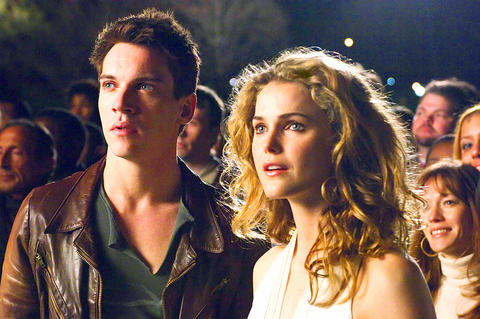To describe August Rush as a piece of shameless hokum doesn't quite do justice to the potentially shock-inducing sugar content of this contemporary fairy tale about a homeless, musically gifted miracle child. August Rush (Freddie Highmore) hears music everywhere. Whether it's the wind in the grass or the roar of a subway, the sounds of the world are a symphony to his ears, and the movie's soundtrack offers a Hollywood realization of a John Cage idea in which all sounds are music.
August, introduced as Evan Taylor, has absolute faith that music will mystically reunite him with his parents, who he is certain must be somewhere out there, although he has no clues to their identity. As we learn early in the movie, those parents - Louis Connelly (Jonathan Rhys Meyers), an Irish rock singer with a musical sweet tooth and Lyla Novacek (Keri Russell), a classical cellist - fell in love at first sight and conceived him on a rooftop overlooking Washington Square but were kept apart by her conniving, ambitious father (William Sadler).
Months after their night of love, the pregnant Lyla is hit by a car and gives birth prematurely. In the most preposterous of the many ludicrous plot twists in a movie whose continuity is flimsy at best, her father forges her signature on adoption papers, gives the baby away, then tells her it died. Louis and Lyla abandon their performing careers and morosely search for they know not what.

PHOTO: AP
In the meantime, Evan flees from a group home in New Jersey to New York City, where he falls in with a band of runaways living in the old Fillmore East Theater in the East Village. Here, Wizard (Robin Williams), the Fagin character in the movie's Oliver Twist-inspired subplot, reigns as their cunning surrogate father who collects and distributes their earnings from panhandling.
When Evan, who has never touched a musical instrument, picks up a guitar for the first time and plays it like a pro, Wizard christens him August Rush, a rock-star-worthy name taken from the side of a truck, and seeing a potential gold mine exploits August for every penny he can earn. After the boy demonstrates the same talent on a church organ, there is no stopping his meteoric ascent. In six months he is conducting a symphony orchestra performance of his original composition on the Great Lawn in New York's Central Park.
The movie, directed by Kirsten Sheridan from a screenplay by Nick Castle and James Hart, is acted in a style best described as overawed. Oblivious to persecution and exploitation, Highmore's August glides through the movie with a beatific smile on his face. Rhys Meyers and Russell, who have no romantic chemistry, wander about in an emotional limbo.
There is a lot of music in August Rush. But except for a couple of gospel songs, most of it, including August's Rhapsody (composed by Mark Mancina), is amorphous, pumped-up schlock.

Cheng Ching-hsiang (鄭青祥) turned a small triangle of concrete jammed between two old shops into a cool little bar called 9dimension. In front of the shop, a steampunk-like structure was welded by himself to serve as a booth where he prepares cocktails. “Yancheng used to be just old people,” he says, “but now young people are coming and creating the New Yancheng.” Around the corner, Yu Hsiu-jao (饒毓琇), opened Tiny Cafe. True to its name, it is the size of a cupboard and serves cold-brewed coffee. “Small shops are so special and have personality,” she says, “people come to Yancheng to find such treasures.” She

The low voter turnout for the referendum on Aug. 23 shows that many Taiwanese are apathetic about nuclear energy, but there are long-term energy stakes involved that the public needs to grasp Taiwan faces an energy trilemma: soaring AI-driven demand, pressure to cut carbon and reliance on fragile fuel imports. But the nuclear referendum on Aug. 23 showed how little this registered with voters, many of whom neither see the long game nor grasp the stakes. Volunteer referendum worker Vivian Chen (陳薇安) put it bluntly: “I’ve seen many people asking what they’re voting for when they arrive to vote. They cast their vote without even doing any research.” Imagine Taiwanese voters invited to a poker table. The bet looked simple — yes or no — yet most never showed. More than two-thirds of those

In July of 1995, a group of local DJs began posting an event flyer around Taipei. It was cheaply photocopied and nearly all in English, with a hand-drawn map on the back and, on the front, a big red hand print alongside one prominent line of text, “Finally… THE PARTY.” The map led to a remote floodplain in Taipei County (now New Taipei City) just across the Tamsui River from Taipei. The organizers got permission from no one. They just drove up in a blue Taiwanese pickup truck, set up a generator, two speakers, two turntables and a mixer. They

Former Chinese Nationalist Party (KMT) chairwoman Hung Hsiu-chu’s (洪秀柱) attendance at the Chinese Communist Party’s (CPP) “Chinese People’s War of Resistance Against Japanese Aggression and the World Anti-Fascist War” parade in Beijing is infuriating, embarrassing and insulting to nearly everyone in Taiwan, and Taiwan’s friends and allies. She is also ripping off bandages and pouring salt into old wounds. In the process she managed to tie both the KMT and the Democratic Progressive Party (DPP) into uncomfortable knots. The KMT continues to honor their heroic fighters, who defended China against the invading Japanese Empire, which inflicted unimaginable horrors on the